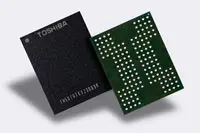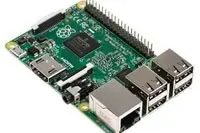Electronics News
Archive : 2 July 2017 год
 Toshiba has developed a prototype sample of a 96 layer BiCS FLASH 3D memory using 3bit/cell technology. Samples of the new device, which has a capacity of 256Gbit, are scheduled for release in the second half of 2017, with mass production targeted for 2018.
Toshiba has developed a prototype sample of a 96 layer BiCS FLASH 3D memory using 3bit/cell technology. Samples of the new device, which has a capacity of 256Gbit, are scheduled for release in the second half of 2017, with mass production targeted for 2018.
The 96 layer stacking process, combined with advanced circuit and manufacturing process technology, sees a capacity increase of approximately 40% per unit chip size over devices featuring 64 layers. It also reduces the cost per bit and increases the manufacturability of memory capacity per silicon wafer.
According to Toshiba, the 96 layer part is likely to meet the performance demands of applications such as enterprise and consumer solid state disks, smartphones, tablets and memory cards.
In the near future, Toshiba says it will use its 96 layer process technology to create larger parts, including 512Gbit flash memories.
Devices featuring 96 layer BiCS FLASH technology will be made in Fab 5 at Yokkaichi Operations, as well as in the new Fab 2 and Fab 6, which is planned to open in summer 2018.
Meanwhile, Toshiba has announced that it has developed a BiCS FLASH memory capable of storing 4bit/cell. The prototype stores 768Gbit on 64 layers.
Author
Graham Pitcher
Source: www.newelectronics.co.uk
 Volvo Cars and Autoliv will work with NVIDIA to develop advanced systems and software for AI self-driving cars. The partners will also work with Zenuity – a newly formed automotive software development joint venture between Volvo and Autoliv – to develop next-generation self-driving car technologies.
Volvo Cars and Autoliv will work with NVIDIA to develop advanced systems and software for AI self-driving cars. The partners will also work with Zenuity – a newly formed automotive software development joint venture between Volvo and Autoliv – to develop next-generation self-driving car technologies.
“Artificial intelligence is the essential tool for solving the incredibly demanding challenge of autonomous driving,” said NVIDIA’s CEO Jensen Huang. “We are building on our earlier collaboration with Volvo to create production vehicles that will make driving safer, lead to greener cities and reduce congestion on our roads.”
Volvo Cars, Autoliv and Zenuity will use NVIDIA’s AI car computing platform as the foundation for their own advanced software development.
Jan Carlson, chief executive of Autoliv, said: “With NVIDIA, we now have full access to the leading AI computing platform for autonomous driving. Autoliv, Volvo Cars and NVIDIA share the same vision for safe, autonomous driving. This cooperation will further advance our leading ADAS and autonomous driving offerings to the market.”
Volvo, Autoliv, Zenuity and NVIDIA will work together to create systems that can use deep learning to recognise objects in their environment, anticipate potential threats and navigate safely.
The NVIDIA DRIVE PX system enables 360° real-time situational awareness and uses a known high-definition map to plan a safe route and drive along it precisely, adjusting to changing circumstances. The system also performs other critical functions, such as stitching camera inputs to create a complete surround-view of the car’s environment.
Zenuity will provide Volvo with self-driving software. Autoliv will also sell this software to third-party OEMs using its established and broad sales, marketing and distribution network.
Production vehicles featuring NVIDIA DRIVE PX are planned for sale by 2021.
Author
Graham Pitcher
Source: www.newelectronics.co.uk
 The team behind Raspberry Pi has won the Royal Academy of Engineering’s MacRobert Medal, one of the most prestigious engineering awards made by a UK organisation. Along with the gold medal, the team also won £50,000.
The team behind Raspberry Pi has won the Royal Academy of Engineering’s MacRobert Medal, one of the most prestigious engineering awards made by a UK organisation. Along with the gold medal, the team also won £50,000.
Pete Lomas, director of engineering with Norcott Technologies and designer of the Raspberry Pi, said: “I’m so pleased for the team and every member of our community that made it possible.”
More than 14million Raspberry Pis have been sold since the device was launched in February 2012, making it the most successful UK developed computer. Originally intended to capture the attention of school students, more than half of the Raspberry Pis sold have been used in industrial applications. Much of the success in the industrial world can be ascribed to support from Farnell and RS Components.
One of the latest variants is the Raspberry Pi Zero, costing just $5.
Raspberry Pi has won the MacRobert Medal at the same time as Intel has decided to stop production of its Joule, Edison and Galileo boards, perceived as competitors.
Author
Graham Pitcher
Source: www.newelectronics.co.uk

